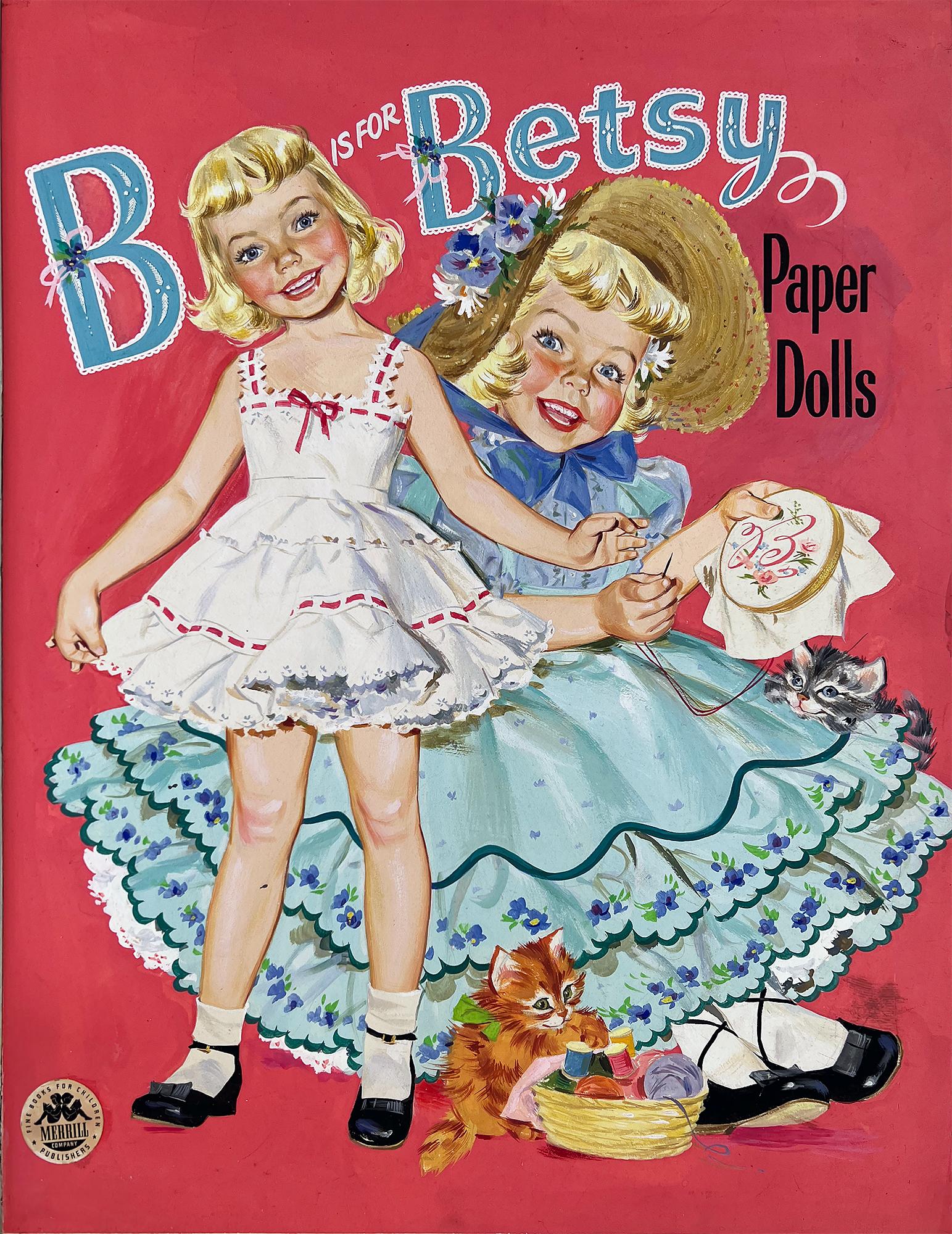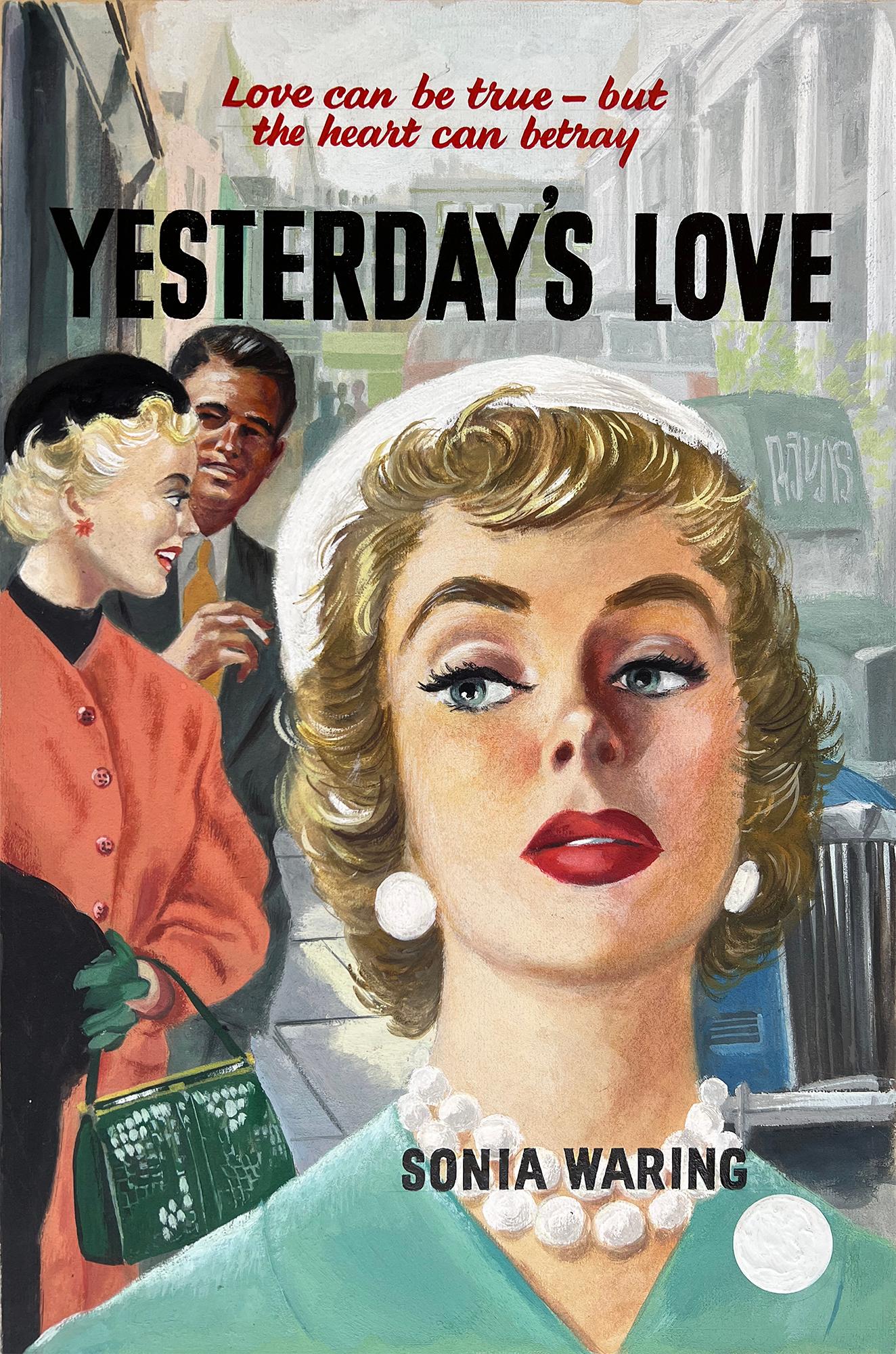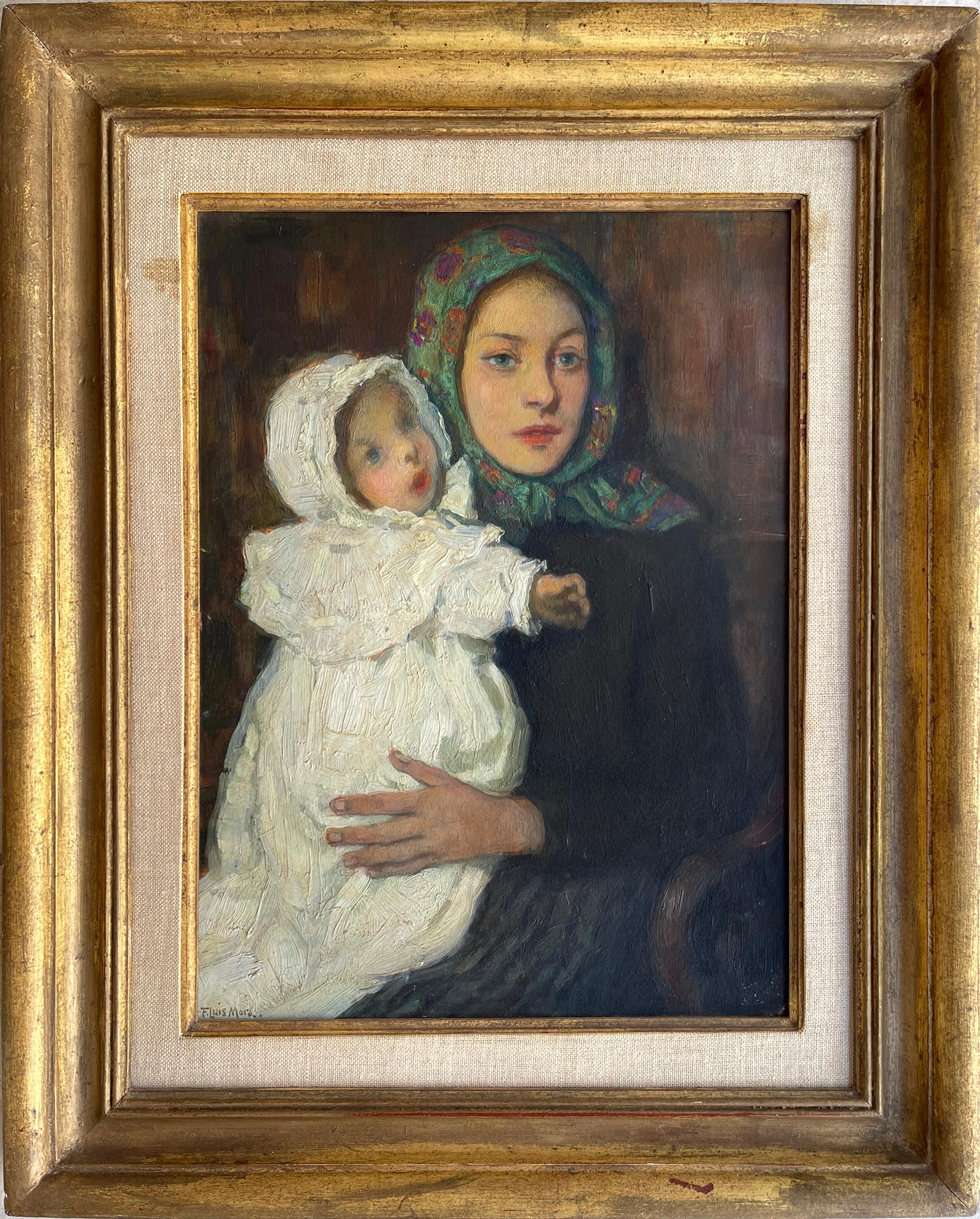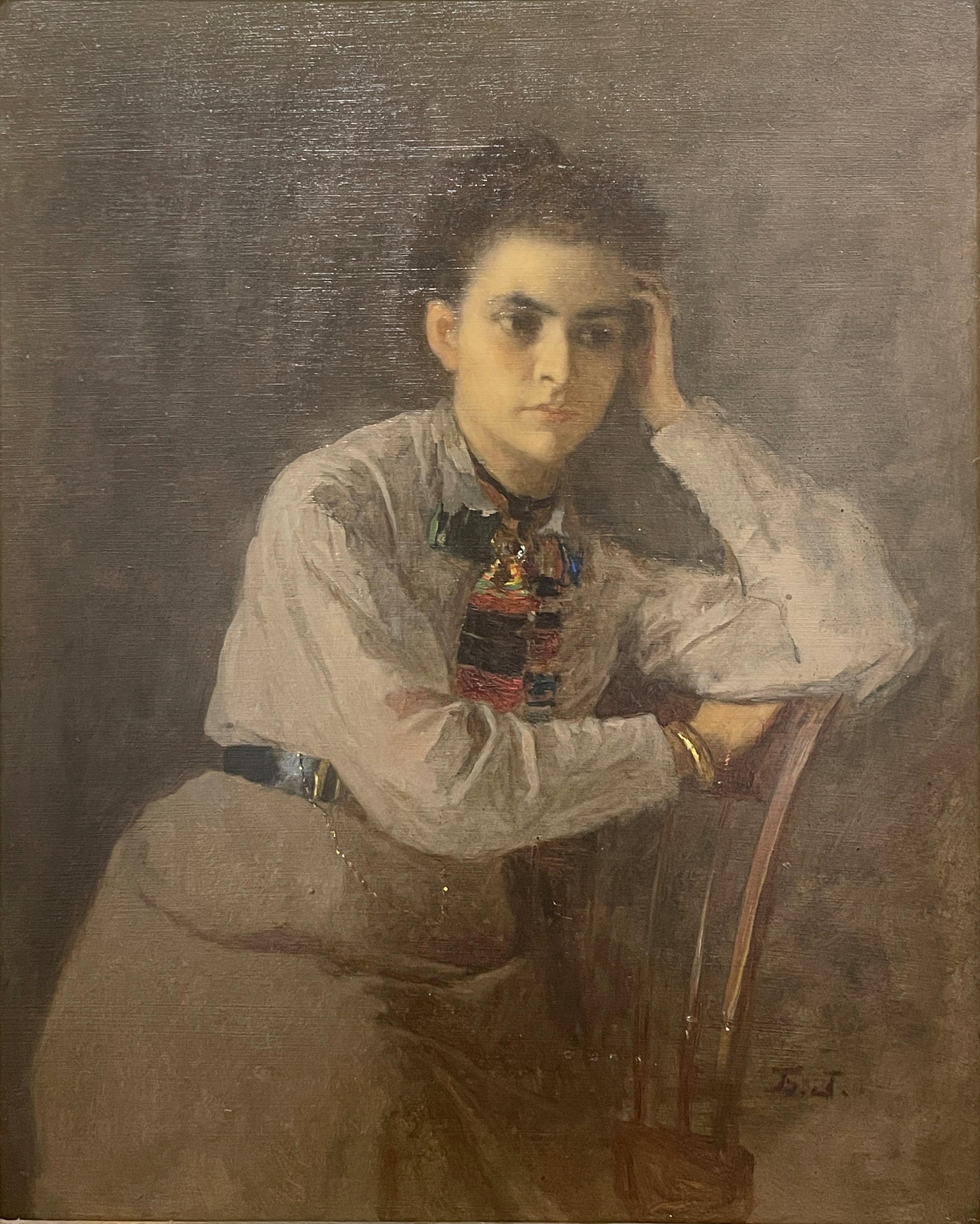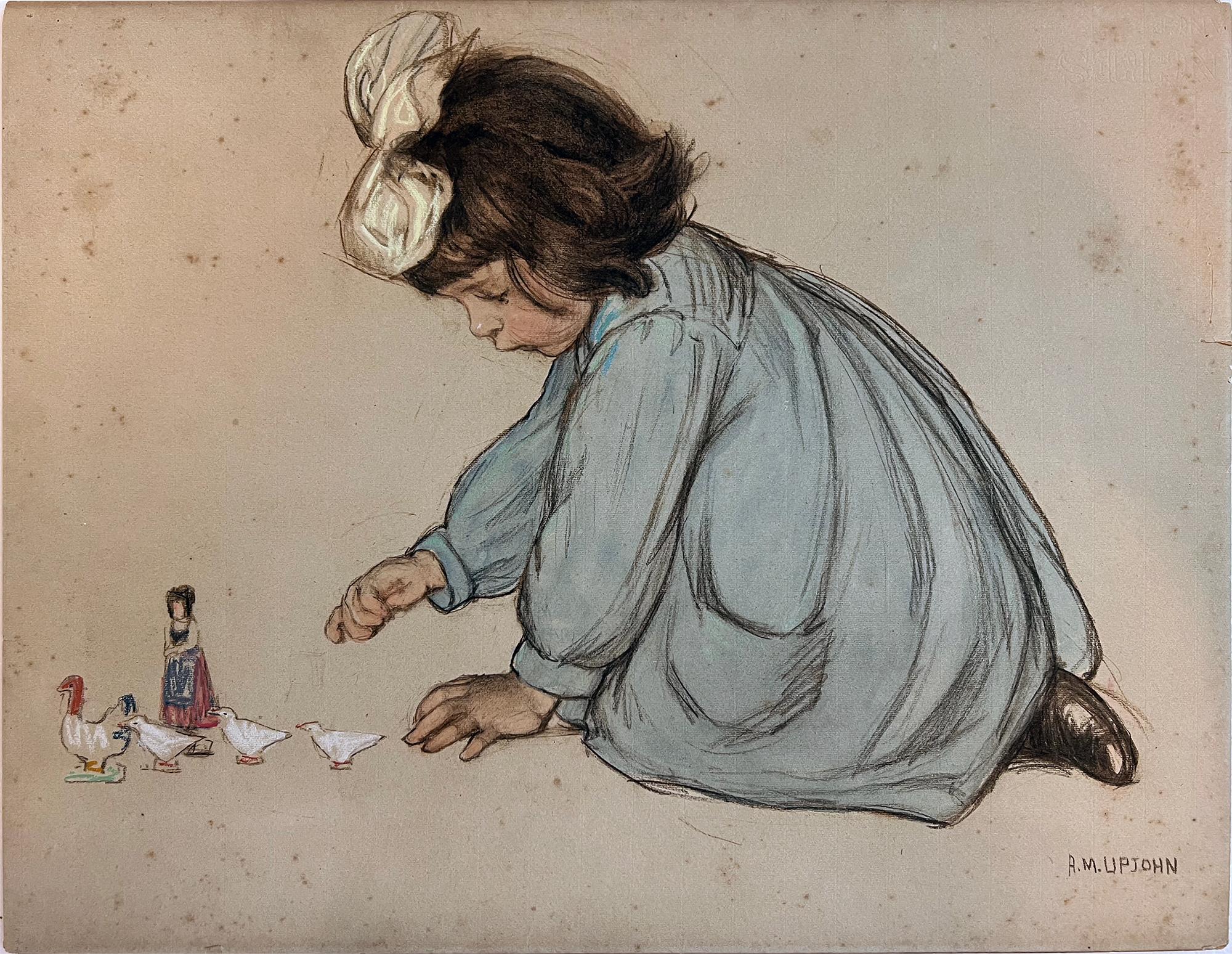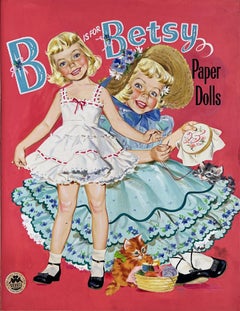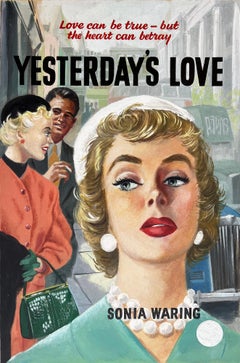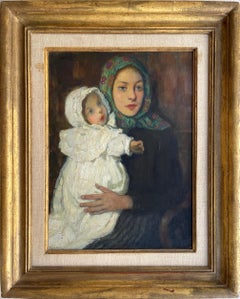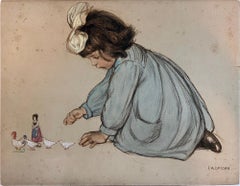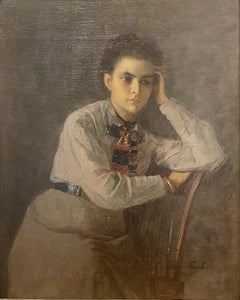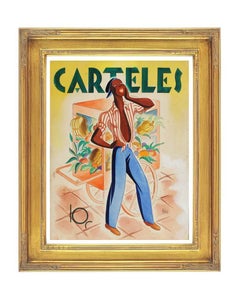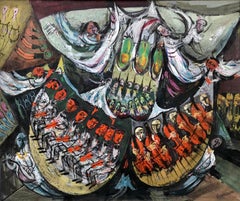Items Similar to Mid-Century Americana "Good House Keeping Magazine", 1948
Want more images or videos?
Request additional images or videos from the seller
1 of 12
Michael SilverMid-Century Americana "Good House Keeping Magazine", 19481948
1948
About the Item
When the Wood Grows Dry "Good House Keeping Magazine" illustration
Surreal depiction of a young mid-century girls social life Good House Keeping Magazine
How friendship and love were depicted in post-war America. There was a sense of innocence and traditional values with young people floating on clouds as a beautiful young woman hits a high note.
Some parts of the extreme fringe areas of the board are torn and bent but it does not affect the live areas of the illustration.
Otherwise work is in good condition commensurate with age. Unframed.
- Creator:Michael Silver (-2)
- Creation Year:1948
- Dimensions:Height: 25 in (63.5 cm)Width: 34 in (86.36 cm)
- Medium:
- Movement & Style:
- Period:
- Condition:Good Fair/. surface undulations to board, toning and slight grim, Loss on edges but outside of live area.
- Gallery Location:Miami, FL
- Reference Number:1stDibs: LU38536301342
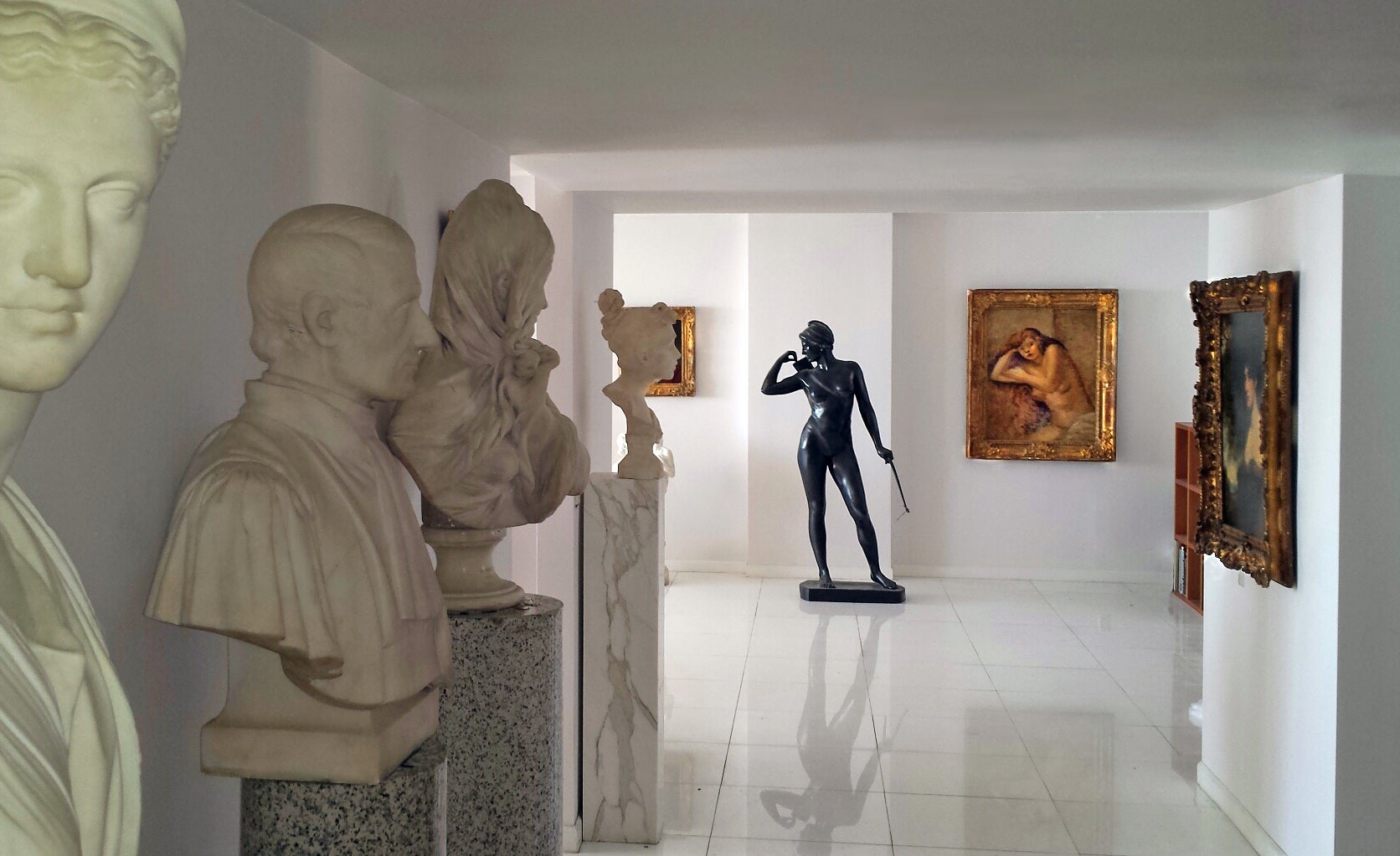
About the Seller
4.9
Vetted Professional Seller
Every seller passes strict standards for authenticity and reliability
Established in 2005
1stDibs seller since 2016
112 sales on 1stDibs
Typical response time: 1 hour
- ShippingRetrieving quote...Shipping from: Miami, FL
- Return Policy
Authenticity Guarantee
In the unlikely event there’s an issue with an item’s authenticity, contact us within 1 year for a full refund. DetailsMoney-Back Guarantee
If your item is not as described, is damaged in transit, or does not arrive, contact us within 7 days for a full refund. Details24-Hour Cancellation
You have a 24-hour grace period in which to reconsider your purchase, with no questions asked.Vetted Professional Sellers
Our world-class sellers must adhere to strict standards for service and quality, maintaining the integrity of our listings.Price-Match Guarantee
If you find that a seller listed the same item for a lower price elsewhere, we’ll match it.Trusted Global Delivery
Our best-in-class carrier network provides specialized shipping options worldwide, including custom delivery.More From This Seller
View AllChildren's Book Cover - Mid-Century Blond Girl - Female Illustrator
Located in Miami, FL
Pioneering Female Illustrator Barbara Briggs Bradley was an in-demand illustrator in the 1950s. Merrill Publishers of their famous children's books hired Barbara Briggs Bradley to d...
Category
1950s Academic Figurative Paintings
Materials
Mixed Media, Gouache, Pencil
Yesterday's Love, Love can Be True. The Heart can Betray
Located in Miami, FL
Classic illustration for a romanace novel from the 1950's in England. Recently these charming works have been the source of interest and even parody. Unsigned, unframed. Vale Studi...
Category
1950s Academic Portrait Paintings
Materials
Gouache, Pencil
Mother and Child - Classic Portrait
By Francis Luis Mora
Located in Miami, FL
This warm portrait looks like it could have been painted by Corot. Francis Luis Mora paints in that tradition. It's a small painting that invites the viewer to look closer. The art...
Category
1920s Academic Portrait Paintings
Materials
Oil, Board
Child Playing with Toy Birds and Doll - School of Jessie Willcox Smith
Located in Miami, FL
Anna Milo Upjohn was an overlooked female illustrator in the school of Jessie Willcox Smith. Her work displays a deep academic knowledge evident in her stylized illustrations of children and engaging their world. Signed lower right- 'A.M.UPJOHN" unframed. She was an assignment artist for renowned women's publications such as The Woman's Home Companion and children's books, as well as commercial assignments.s for the Red Cross. Unframed
Anna Milo Upjohn (1868–1951) was an American artist, illustrator, author, and relief worker who, late in her long career, became known for paintings, drawings, and illustrations she made for the American Red Cross. After graduating from high school, she studied art briefly in New York but obtained most of her training in Paris from Claudio Castelucho and Lucien Simon.[1] In the early years of the twentieth century, she became known both for her portraits and paintings of children and for her book and magazine illustrations. Finding herself in France at the outset of the First World War, she devoted herself to relief work first among the refugees in Paris and later among the devastated villages in France and Belgium. Having spent the first half of her adult life as an independent professional, she served as a staff artist for the American Red Cross between 1921 and 1931. She traveled extensively during her adult life and lived mostly in New York City; Ithaca, New York; and Washington, D.C.
Early life and training
During the 1870s, Upjohn's family lived with her grandfather, a well-known architect named Richard Upjohn who had retired to a scenic home in Garrison, New York. Richard Upjohn's biographer says when she was about five she would accompany him as he sketched and painted. She questioned him about his color choices and learned that artists often chose colors different from the ones present in the subjects they painted. He also showed her engravings of famous paintings, explaining what made them great and where they fell short in his view.[2] Her family was living in Fond du Lac, Wisconsin when she graduated from high school in 1887.[3] A few years later, the family moved to New York, where, in the early 1890s, she took classes at the Cooper Union Woman's Art School.[4] She began her foreign travels in 1893 and during the next few years studied art in Munich, Florence, and Paris.[5] In 1902, she took an illustration class at the National Academy of Design and the following year won the Academy's Suydam silver medal for her work.[6] Between 1909 and 1912, she studied and traveled in Europe's other major cities.[7] In 1922, Upjohn told a reporter that she had studied art "in many places, usually for a few months at a time and disconnectedly, but what counted most was the work she did in Paris under Castelucho and Lucien Simon.”[1] Born in Barcelona, Castelucho's birth name was Claudi Catelucho Diana, but he went by his surname alone. In Paris during the early years of the twentieth century, he and Simon both trained private students and both taught at two mondernist alternatives to the École des Beaux Arts: the Académie Colarossi and the Académie de la Grande Chaumière.[8] Upjohn did not say whether she took private lessons, classes, or both.
Career in art
Image No. 1, Anna Milo Upjohn, Young Boy Going Fishing, 1910, oil on canvas, 25 x 30 inches
In 1890, at the age of twenty-one, Upjohn completed a painting of angels for St. Paul's Episcopal Cathedral in Fond du Lac, Wisconsin. Her uncle Richard M. Upjohn had designed the building and her father was currently its rector (having succeeded John Henry Hobart Brown...
Category
1910s Academic Figurative Paintings
Materials
Charcoal, Pastel, Mixed Media, Watercolor
BMW Isetta, Messerschmitt Cars Autobahn - Humorous Mid-Century Illustration
Located in Miami, FL
One of the hallmarks of great art is recognizing the artist's style instantly. This is the case with Richard Erdoes. His highly stylized comic figures are expressive and communicate the story delightfully and joyfully. Even though this work is rendered in flat, minimalistic two colors, the inventive shape relationships and positive and negative areas convey a very high level of artistic skill. The present work was done on assignment for the prestigious Standard Oil ( Exxon's predecessor ) corporation's company magazine, The Lamp. Although not a newstand magazine, The Lamp had the highest editional and artistic content. Work is unsigned and unframed.
Richard Erdoes (Hungarian Erdős, German Erdös; July 7, 1912 – July 16, 2008) was an American artist, photographer, illustrator and author.
Early life
Erdoes was born in Frankfurt,to Maria Josefa Schrom on July 7, 1912. His father, Richárd Erdős Sr., was a Jewish Hungarian...
Category
1950s Outsider Art Figurative Paintings
Materials
Gouache, Illustration Board, Pencil
Love Story. Mid Century Desaturated Color
By Jon Whitcomb
Located in Miami, FL
Most likely for Redbook, Cosmopolitan, Collier's Weekly, Good Housekeeping or Macall's
Category
1950s American Realist Figurative Paintings
Materials
Gouache, Board
You May Also Like
"Adelaide" Eastman Johnson, Portrait by Prominent American Genre Painter
By Eastman Johnson
Located in New York, NY
Eastman Johnson
Adelaide, circa 1870-79
Signed with initials lower right; titled on the reverse
Oil on board
19 x 15 inches
For many years the foremost genre painter in the United ...
Category
1870s Academic Figurative Paintings
Materials
Oil, Board
1938 Cuban Illustration Gouache Painting Carteles Magazine Andres Garcia Benitez
Located in Buffalo, NY
An original illustration by Cuban artist Andres Garcia Benitez which was used for the cover of the iconic Carteles magazine in November of 1938.
...
Category
1930s Realist Portrait Paintings
Materials
Watercolor, Gouache, Illustration Board
Modernist Orchestra Musical Gouache Painting Boston Expressionist
By David Aronson
Located in Surfside, FL
Very vibrant, dynamic orchestra scene reminiscent of the work of Mopp (Max Oppenheim)
David Aronson, (1923-2015) son of a rabbi, was born in Lithuania in 1923 and immigrated to America at the age of five. He settled in Boston, Massachusetts where he studied at the school of the Museum of Fine Arts under Karl Zerbe, a German painter well known in the early 1900s. Aronson later taught at the school of the Museum of Fine Arts for fourteen years and founded the School of Fine Art at Boston University where he is today a professor emeritus. An internationally renowned sculptor & painter, Aronson has won acclaim for his interpretation of themes from the Hebrew Talmud and Kabala. His best known works include bronze castings, encaustic paintings, and pastels. His work is included in many important public and private collections, and has been shown in several museum retrospectives around the country. He is considered to be one of the most important 20th century American artists.
At twenty-two David Aronson had his first one-man show at New York's Niveau Gallery. The next year, six of his Christological paintings were included in the Fourteen Americans exhibition at Manhattan's Museum of Modern Art where Aronson’s work was included alongside abstract expressionists Arshile Gorky, Robert Motherwell and Isamu Noguchi. In the 1950s, Aronson turned more toward his Jewish heritage for the inspiration for his art. Folklore as well as Kabalistic and other transcendental writings influenced his work greatly. The Golem (a legendary figure, brought to life by the Maharal of Prague out of clay to protect the Jewish community during times of persecution) and the Dybbuk (an evil spirit that lodges itself in the soul of a living person until exorcised) frequently appear in his work.
In the sixties, Aronson turned to sculpture. His work during this period is best exemplified by a magnificent 8’ x 4’ bronze door which now stands at the entrance to Frank Lloyd Wright's Johnson Foundation Conference Center for the Arts in Racine, Wisconsin. In the seventies and eighties, Aronson continued his work in pastel drawings, paintings, and sculptures, often exploring religion and the frailties of man's nature. During this time, in addition to a traveling retrospective exhibition and many one-man shows in New York, Los Angeles, Chicago, and Boston at the Pucker-Safrai Gallery on Newbury Street, Aronson won many awards and became a member of the National Academy of Design in New York. Two years ago he retired from teaching to work full-time in his studio in Sudbury, Massachusetts.
included in the catalog
Contemporary Religious Imagery in American Art
Catalog for an exhibition held at the Ringling Museum of Art, March 1-31, 1974.
Artists represented: David Aronson, Leonard Baskin, Max Beckmann, Hyman Bloom, Fernando Botero, Paul Cadmus, Marvin Cherney, Arthur G. Dove, Philip Evergood, Adolph Gottlieb, Jonah Kinigstein, Rico Lebrun, Jack Levine, Louise Nevelson, Barnett Newman, Abraham Rattner, Ben Shahn, Mark Tobey, Max Weber, William Zorach and others.
Selected Awards
1990, Certificate of Merit, National Academy of Design
1976, Purchase Prize, National Academy of Design
1976, Joseph Isidore Gold Medal, National Academy of Design
1976, Purchase Prize in Drawing, Albrecht Art Museum
1975, Isaac N. Maynard Prize for Painting, National Academy of Design
1973, Samuel F. B. Morse Gold Medal, National Academy of Design
1967, Purchase Prize, National Academy of Fine Arts
1967, Adolph and Clara Obrig Prize, National Academy of Design
1963, Gold Medal, Art Directors Club of Philadelphia
1961, 62, 63, Purchase Prize, National Institute of Arts and Letters
1960, John Siimon Guggenheim Fellowship
1958, Grant in Art, National Institute of Arts and Letters
1954, First Prize, Tupperware Annual Art Fund Award
1954, Grand Prize, Third Annual Boston Arts Festival
1953, Second Prize, Second Annual Boston Arts Festival
1952, Grand Prize, First Annual Boston Arts Festival
1946, Traveling Fellowship, School of the Museum of Fine Arts
1946, Purchase Prize, Virginia Museum of Fine Arts
1944, First Popular Prize, Institute of Contemporary Art
1944, First Judge's Prize, Institute of Contemporary Art
Selected Public Collections
Art Institute of Chicago
Virginia Museum of Fine Arts
Bryn Mawr College
Brandeis University
Tupperware Museum, Orlando, Florida
DeCordova Museum
Museum of Modern Art Print Collection, New York
Atlanta University
Atlanta Art...
Category
20th Century Expressionist Figurative Paintings
Materials
Gouache, Board
Antique Illustration of a Golfer by Listed Illustrator for Vanity Fair
Located in Buffalo, NY
Antique illustration of a golfer getting out of a sand trap by well listed illustrator Leslie Saalburg whose work appeared in Vanity Fair and Esquire.
Category
1910s Realist Figurative Paintings
Materials
Gouache, Illustration Board
"The Clown", 20th Century Gouache on Cardboard by Spanish Artist Celso Lagar
By Celso Lagar
Located in Madrid, ES
CELSO LAGAR
Spanish, 1891 - 1966
THE CLOWN
signed and dated "Lagar 52" (lower right)
gouache on cardboard
10-5/8 x 8 inches (27 x 20.5 cm.)
PROVENANCE
Private French Collector
Cel...
Category
1950s Fauvist Portrait Paintings
Materials
Gouache, Cardboard
Highly Decorative Painting Of A Young Lady With Meadow Flowers In Her Straw Hat
Located in Sutton Poyntz, Dorset
Alice Anne Renshaw.
English ( b.1849 - d.1900 ).
Young Lady With Meadow Flowers In Her Straw Hat.
Watercolor & Gouache On Artist's Board.
( An embossed stamp in the top left hand corner reads 'Turnbull’s Superfine London Board' ) .
Signed Lower Left.
Image size 21.3 inches x 16.7 inches ( 54cm x 42.5cm ).
Frame size 29.9 inches x 25.6 inches ( 76cm x 65cm ).
Available for sale; this original painting is by Alice Anne Renshaw and dates from around 1880.
The painting is presented and supplied in its original highly ornate...
Category
Late 19th Century Realist Figurative Paintings
Materials
Watercolor, Gouache, Board
Recently Viewed
View AllMore Ways To Browse
Michael Good
Bent Wood Art
Anna Sobkowiak
Anne Mei Poppe
Antique Potato Peeler
Anton Dam
Antonia Mastrocristino Sirena On Sale
Arcangelo Di Jacopo Del Sellaio
Arielle Tonkin
Armando Campero
Arnulf De Bouche
Arrue Ramiro
Arthur Sheppard
Artur Soletskyi
Asmaa Khoury
Astrid Stofhas
Audrey E. Gabrielson On Sale
Aydemir Saidov
